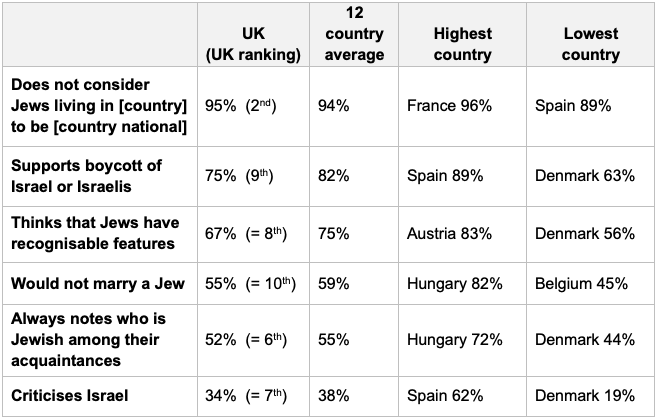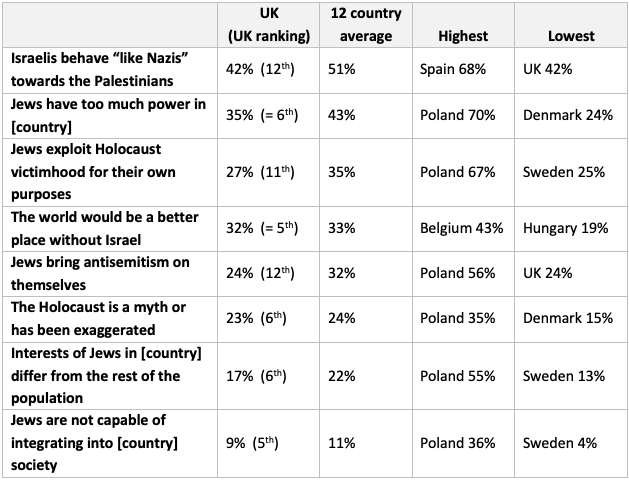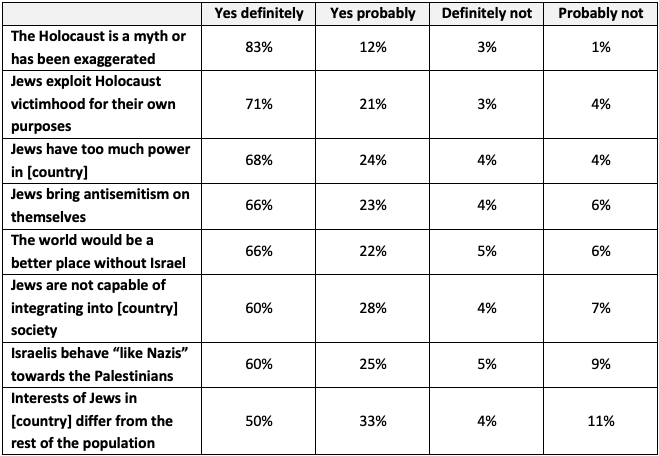CST Blog
EU Survey: What do British Jews Consider to be Antisemitic?
20 December 2018
Recent CST blogs have shown the UK and overall European findings from the European Union Agency for Fundamental Rights (FRA) survey, ’Experiences and perceptions of antisemitism - Second survey on discrimination and hate crime against Jews in the EU’, which follows and updates the Agency’s landmark 2012 survey.
Both surveys were conducted by London’s Institute for Jewish Policy Research (JPR). CST is proud of its partnerships with both the Agency and JPR; and to have played its part in helping to plan, conduct and publicise both surveys.
This, the third and last CST Blog derived from the survey, shows what British and other European Jews consider to be antisemitic.
Do you consider these actions or opinions by non-Jews to be antisemitic?
The most important of the below figures, due to how often they arise in political argument, are those regarding British Jewish attitudes to anti-Israel boycotts and criticism of Israel.
The figures show three-quarters of British Jews regard “supports boycott of Israel or Israelis” as being antisemitic; and that one-third of British Jews consider criticism of Israel to be antisemitic.
Many of those who advocate boycotts of Israel do so without appreciation or consideration for the high number of British Jews who sincerely believe that such activity is antisemitic. In the previous 2012 survey, 65% of British Jews answered that boycotting “Israeli goods / services” was antisemitic, but it should be noted that this wording was slightly different to the 2018 question, which is more catch-all, in that it refers simply to “Israel or Israelis” and had a 75% finding.
In the 2012 survey, 32% of British Jews held “criticises Israel” to be antisemitic, a near identical total to the 2018 finding of 34%. At one in three respondents, this is a sizeable figure, but it is considerably less than the total relating to boycotts. It shows that, for most Jews, boycotts essentially move anti-Israel criticism into an antisemitic space.
The UK ranking is shown beneath in brackets, indicating how offended British Jews are by such actions and opinions, compared to other EU Jewish nationalities. It should however be noted that in many cases there are only small percentage differences between the UK and other states.

Respondents who have heard or seen antisemitic statements made by non-Jews in last 12 months.
The columns to the right of the statements show how often British Jews encountered selected antisemitic statements in the previous 12 months (whether in person, on the internet, in media, in politics or elsewhere). The UK ranking is shown beneath in brackets, indicating the relative prevalence of such statements in Britain, compared to other EU nations. It should, however, be noted that in many cases there are only small percentage differences between the UK and other states.

Do you consider these statements to be antisemitic when made by a non-Jew? Average of the 12 EU Jewish communities surveyed.
(Note: the survey does not provide individual country listings for these findings. It only gives the average of the states surveyed.)

Would “the prohibition of circumcision or traditional slaughter” be a problem?
The survey gives only gives aggregate figures for those finding prohibitions to be problematic:
80% of British Jews would consider prohibition of brit milah (circumcision) to be a “very big problem” or “a fairly big problem”. The 12 country average is 82%, with Italy highest at 91% and Poland lowest at 48%.
71% of British Jews would consider prohibition of shechita (traditional slaughter) to be a “very big problem” or “a fairly big problem”. The 12 country average is 69%, with Italy highest at 79% and Poland lowest at 38%.
The UK brit milah figure, 80%, is identical to the 2012 finding. The UK shechita figure, 71%, is a 5% rise from the 2012 finding of 66%.
Read More

Antisemitic Incidents Report January-June 2025
6 August 2025

Love since 7 October
14 February 2025

Antisemitic Incidents Report 2024
12 February 2025